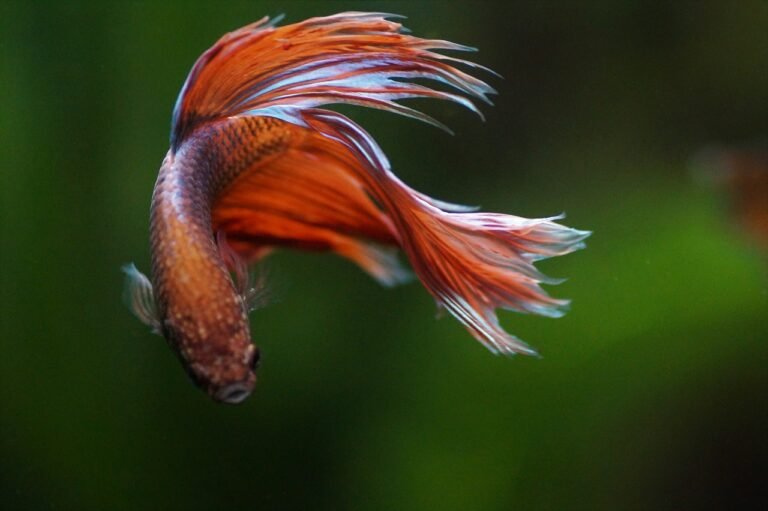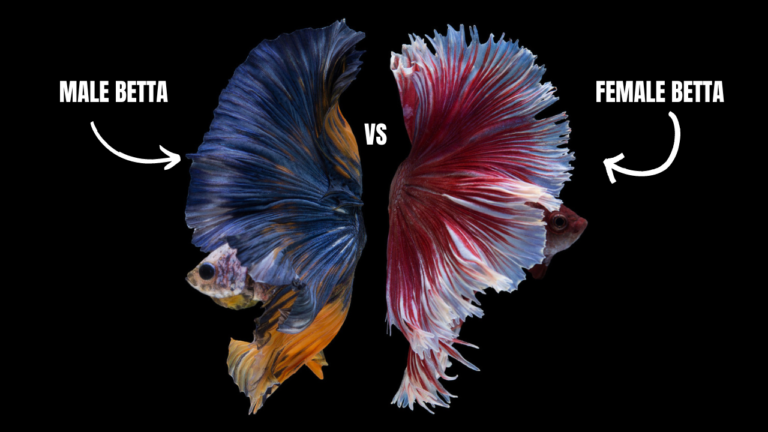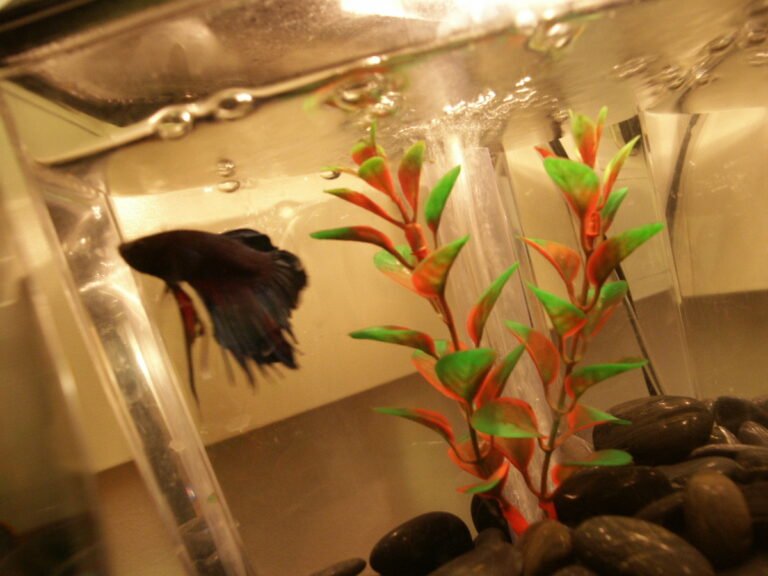As aquarium enthusiasts, we are frequently spellbound by the entrancing moves and splendid hues of our dear Betta fish. Yet, have you ever pondered the sleeping habits of these amazing creatures? Do Betta fish sleep at all, and if they do, how? In this exhaustive guide, we will investigate the universe of Betta fish slumber, tending to their novel rest cycles, positions, and what factors influence them to rest.
The sleep patterns
Like many other living organisms, bettas need adequate rest to rejuvenate and function properly. Although their patterns may differ from those of mammals or birds, sleep is a form of rest. During this period, when they are not active much and less responsive to external stimuli, there comes some kind of rebirth.
How do Betta fish sleep?
You will be amazed by how different this type of creature’s way of sleeping is from ours as humans were used to seeing people lying down while taking naps, but then again, we should remember that each species has its own unique characteristics, including sleep positions. Unlike human beings who typically lie flat on their backs with eyes closed during a deep slumber phase – an upright position close to the surface, mostly among plants or decorations inside the tank, serves better for a betta fish. This allows them to remain as still as possible because breathing does not stop even when asleep.
Here are some common sleeping positions you may observe in your Betta fish:
- Hovering near the surface: One common way these fishes nap is by hovering just below water level, where they appear almost like floating with the body slightly inclined and fins flapping softly so as not to drift away.
- Resting on plants or decorations: Another option besides driftwood could be resting against leaves or other things found within its environment, such as caves, etcetera
- Wedged in a corner: Some bettas prefer wedging themselves against one corner wall while maintaining an erect posture throughout sleep.
In their sleeping slumber, slight fin or gill movements can be observed, indicating they are still alive and breathing. Remember that mammalian deep sleep does not apply here since even the lightest touch will wake them up because this type of creature’s rest is very shallow. This is why you should avoid making abrupt moves when close to it while taking a nap; disturbances in the environment could easily make it awake from its short-lived dreams.
Factors that affect sleep of Betta fish
Several factors can influence the sleep patterns and quality of sleep for Betta fish. Understanding these factors can help you create an optimal environment for your fish to rest comfortably.
- Light Exposure: Betta fish are diurnal animals, meaning they are most active during daytime hours and usually sleep at night, but continuous bright illumination or lack thereof might disrupt normal rest-wake patterns.
- Water Quality: Inadequate tank hygiene can lead to ammonia poisoning, which in turn affects their ability to take a good nap, as well other pollutants like nitrites, among others too, cause stress, thus interrupting the proper sleeping rhythm of these fishes. So ensure keeping clean filtered tanks always if you want your pet to have peaceful sleeps every time.
- Tank Size And Decorations: For better-quality slumbers, they need comfortable, safe hiding places where they can curl up undisturbed, so try adding more plants or caves to their habitat. Larger tanks also allow more space for movement and exploration, promoting healthier rest periods.
- Temperature: Betta fish can flourish in warm water ranging from 76°F to 82°F (24°C to 28°C). Changes or extremes in temperature may affect their metabolism and interrupt their sleep.
- Noise and vibrations: Loud noises or vibrations near the tank can startle Betta fish and disrupt their sleep. It is advisable to keep their surroundings as quiet and peaceful as possible, especially during rest periods.
How long do Betta fish sleep?
There is no set amount of time that a betta will sleep, but on average, they sleep for a few hours each night. Some bettas may sleep for as little as two hours, while others could rest for 12-14 hours. It’s worth noting that these figures can be influenced by factors like age, health status, and environmental conditions.
Sleeping positions of Betta fish
As mentioned earlier, Betta fish have unique sleeping positions that differ from other fish species. Here are some common sleeping positions you may observe:
- Vertical hovering is when they hang vertically close to the surface, motionlessly or among plants/decorations.
- Leaning against surfaces – Sometimes bettas lean against tank walls, plants, decor, etc., using them as support structures during their naptime.
- Wedged in corners—In some cases, a betta may prefer wedging itself into one corner of its tank, employing the sides/walls as props to stay upright while asleep.
- Resting on the substrate—Occasionally, during this period, you might find your pet resting on gravel or sand at the bottom of its aquarium.
It’s important to note that these sleeping positions can vary among individual Betta fish and may also depend on the tank setup and available resting spots.
Do Betta fish sleep at night?
Yes, bettas are diurnal animals, meaning they are active during the day and sleep at night. Nevertheless, their sleeping habits can still be affected by factors like light exposure and prevailing environmental conditions.
If you notice your Betta fish lying motionless or hovering in one place during the day, do not worry. It is not necessarily a sign of sickness or distress. These creatures usually take short naps throughout the day, especially after periods of activity or feeding.
Differentiating between a sleeping Betta fish and a dead one
One of the common concerns among Betta fish owners is distinguishing between a sleeping fish and a dead one. While it may seem challenging at first, there are a few key differences to look for:
- Movement—An alive but dormant betta will show some slight movements, such as gill flares/twitches, indicating that it is still breathing. On the other hand, if no part seems to move, then the creature has most likely passed away.
- Position—During slumber, these animals normally keep themselves upright or may lean against something nearby, whereas when lifeless, they tend to sink down towards the tank’s bottom surface or even float lifelessly at the topmost part of the water column.
- Responsiveness—Try tapping lightly against the glass jar wall where the fish reside to create a minor disturbance; if sleeping Betta reacts/responds in any way, then probably everything is okay, but if no response comes forth from a supposedly dead individual after several attempts, then chances are high it could be true indeed.
- Appearance- Healthy sleeping bettas retain vibrant colors well. However, those who have died might appear duller than usual, discolored all over the body, eyes cloudy, etc.
If you still need clarification or have concerns about your Betta fish’s condition, consulting with an experienced aquarium professional or veterinarian is always best.
Find here : how long do betta fish live ?
Creating sleep environment
To promote healthy sleep patterns and overall well-being for your Betta fish, creating a suitable sleep environment is essential. Here are some tips to consider:
- Keep a consistent light cycle: Give your Betta fish a sense of day and night by keeping their light on at certain times. Use a timer or turn it off manually during their natural sleep-wake cycle.
- Hide and Resting Places: Bettas feel safer when they have somewhere to rest and hide. You can put plants or decorations such as driftwood in the tank that provide good hiding spots for them.
- Maintain clean water conditions: Test your tank’s pH, ammonia, nitrite, and nitrate levels regularly. Perform partial water changes and keep the tank clean so that your Betta lives a stress-free, healthy life.
- Reduce noise & vibration: Eliminate loud noises or vibrations near their tank that may interfere with their sleep patterns. Move their tank to a quieter location or use materials that reduce vibrations if necessary.
- Keep water temperature right: Keep the water temperature stable between 76°F -82°F (24°C-28°C) using an adjustable heater with a reliable thermometer for monitoring it.
By creating a conducive sleep environment, you can help your Betta fish establish healthy sleep patterns, which will contribute to their overall well-being and longevity.
promoting healthy sleep for Betta fish
In addition to creating a suitable sleep environment, there are several other tips you can follow to promote healthy sleep for your Betta fish:
- Feed them different foods that have good nutritional value, such as proteins, vitamins, minerals, etc. These aid in promoting strong immune systems and supporting natural sleep cycles among these types of pets.
- Avoid overfeeding: Overeating causes stomach problems, which may result in sleeplessness because the stomach becomes uncomfortable. Follow feeding guidelines strictly and remove uneaten food from the aquarium.
- Introduce other fish carefully: These buddies are compatible with some betta fish tank mates, but adding new fish or aggressive species can stress bettas out and interrupt their sleep patterns. So, always research such things before putting them together.
- Do not disturb them while sleeping. Try not to make any kind of noise around where your Betta sleeps during its usual resting hours. This means no sudden movements, bright lights, etc., should be allowed near it at this time so as to prevent startling it and waking it up from restful slumber.
- Monitor health status closely: Keep an eye on how your Betta behaves and looks because illness and stress levels directly affect one’s ability to sleep, thus affecting these pets, too. Treat any abnormality noticed immediately without delay so they can continue having good naps.
Following these tips and providing a suitable environment can help your Betta fish establish healthy sleep patterns and maintain their overall vitality.
Monitoring the sleep patterns of Betta fish
As a responsible Betta fish owner, monitoring their sleep patterns and behavior is essential. Observing their sleep habits can provide valuable insights into their health and well-being. Here are some tips for monitoring your Betta fish’s sleep patterns:
- Create an observation schedule: Set aside time every day or week to watch your betta fish’s sleep cycles. You could do this during its regular rest periods or when doing tank maintenance.
- Maintain a logbook: Record what you see, including sleep duration and positions taken while asleep, among other things worth noting; this will let you notice trends and identify possible problems earlier rather than later.
- Watch environmental conditions: Consider factors such as water quality, temperature levels, lighting arrangements, and tank setup, as these affect bettas’ sleep.
- Watch out for signs of distress or sickness of betta fish: Changes such as becoming sluggish, losing appetite, or changing coloration can interfere with one’s ability to fall asleep, which can also interfere with overall health.
- Seek professional help: Should there be any unusual change noticed concerning how bettas sleep or if questions arise about it, then consulting experts like experienced aquarists could offer appropriate guidance based on their knowledge in this area, while veterinarians might also contribute positively towards resolving such issues.
By monitoring your Betta fish’s sleep patterns and addressing any potential issues promptly, you can ensure their overall well-being and provide them with the best possible care.
How Long Does Betta Fish Sleep?
The amount of time bettas spend sleeping varies from one individual to another, though most often, they snooze for several hours each night. Some may take 12- 14-hour naps, whereas others only doze for brief periods lasting a few hours at once. However, that doesn’t mean these numbers are fixed because many things influence them, such as age, wellness state, and surrounding circumstances.
They are diurnal creatures, which implies being active during the day while resting when night falls. However, unlike humans, their sleep patterns are not rigidly fixed. They can also take short naps or rest throughout the day.
Your betta fish’s sleeping habits can tell much about its overall health. Any significant change in duration or behavior of betta fish should be taken seriously, as it may signal an underlying problem that needs immediate attention.
How does Betta fish sleep in a tank?
Betta fish have unique sleeping habits adapted to their natural environment. A tank or aquarium typically adopts a vertical sleeping position, either hovering near the water’s surface or resting against plants, decorations, or the tank walls.
Here are some common ways Betta fish sleep in a tank:
- Close to the surface: The most common way a Betta sleeps is by staying just below the water level. It may look like they are floating with slightly tilted bodies and moving fins to remain still.
- Resting on leaves or other objects: Some bettas rest on plant leaves, driftwood pieces, and other decorative items in their tanks, which provide stability as they lean against them while asleep.
- Tucked in a nook: Some betta fish prefer to sleep tucked away in a corner of the tank, pressing against the walls of their container to keep from falling over.
- Resting on the gravel: In other instances, bettas may rest on the substrate or gravel at the bottom of their tanks when asleep.
For a tank to be a conducive sleeping environment for your betta fish, hiding spots and resting places should be provided while maintaining good water quality. You must also have a reliable lighting system that mimics natural light cycles and minimizes disturbances during daily sleep, which can promote healthy sleep patterns.
Bear in mind that each individual’s position may differ from others, so observe them closely and make changes where necessary based on what they like best about their sleeping arrangement in an aquarium setting such as this one!
Conclusion and final thoughts
Betta fish are beautiful creatures with unique sleeping habits that captivate aquarium enthusiasts. This comprehensive guide has explored the various aspects of Betta fish sleep, including their sleep patterns, positions, and the factors that influence their rest.
Understanding their sleeping habits and creating a suitable environment ensures your Betta fish receives the rest it needs to thrive. Remember, monitoring their sleep patterns and addressing any potential issues promptly is crucial for their overall well-being.
As responsible Betta fish owners, we must provide the best care for these remarkable creatures. Following the tips and insights in this guide, you can create a comfortable and conducive environment for your Betta fish to enjoy restful and rejuvenating sleep.







